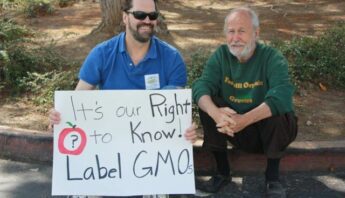Here we go again. With November's election on the horizon, the world's largest pesticide and biotech corporations are investing heavily to defeat Washington state's GE labeling ballot initiative. Topping the list of opponents, Monsanto gave $4.6 million to the "No on 522" campaign earlier this month. And last week, DuPont gave $3.2 million.
Bayer and Dow — also among the "Big 6" pesticide corporations — have contributed significant funds to defeat the initiative, too. And as we know from last year's labeling battle in California, the corporate cash is likely to keep pouring in.
But why are the Big 6 so vehemently opposed to labeling food with genetically engineered (GE) ingredients? Because they fear losing marketshare. As the primary corporations controlling the world’s pesticide and seed markets, Monsanto & Co. enjoy the profits of a virtual monoply. They continue to produce seeds that require more and more pesticide use — ensuring they have a continued market for their products.
As PAN senior scientist Dr. Marcia Ishii-Eiteman wrote last year about the Prop 37 campaign:
"The dirty little secret behind GE crops is that they are marketing engines for the pesticide industry. Whatever the ads and manipulated media spots say, this is why Monsanto et al. are pulling out all the stops to halt California's labeling initiative."
While 64% of likely voters currently support passing the GE labeling initiative in Washington, the Big 6 are investing — heavily — to shift public opinion.
Where have I heard that before?
Big 6 money isn't the only similarity between the Prop 37 fight last year and the labeling campaign in Washington. Opponents are dragging out the same fear-based arguments, namely that labeling genetically engineered food will result in high food prices for consumers.
Countering this claim directly, a new study — commissioned by Just Label It and conducted by independent researcher Kai Robertson — looked at correlations between how prices are set at supermarkets and product label changes. Turns out, they're not linked. As stated in a press release last week,
Robertson identified the key factors that influence retail prices, including consumer demographics and rival pricing behavior, along with market, chain and store characteristics. Wholesale prices have less of an effect on retail prices than these demand-related forces, and there is no evidence that label changes affect wholesale prices.
Robertson identified the key factors that influence retail prices, including consumer demographics and rival pricing behavior, along with market, chain and store characteristics. Wholesale prices have less of an effect on retail prices than these demand-related forces, and there is no evidence that label changes affect wholesale prices. – See more at: http://justlabelit.org/press-room/#PR29
And in the words of the researcher:
"Food processors regularly make changes to the labels of their products – as part of ongoing product innovation to anticipate and meet changing consumer demands and for other marketing and regulatory reasons."
In short, GE labels won't result in sticker shock at the supermarket. They will allow consumers to make informed choices, to know what's in their food and how it was grown. Claiming otherwise is a tactic clearly intended to scare and misinform voters.
Support GE labeling!» The Yes on I-522 campaign is in need of volunteers. Sign up to phone bank, or contribute to the campaign. A win in Washington state will open the gates for GE labeling across the country!







